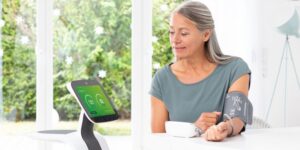
Home care is being revolutionized by the latest technologies, from AI voice assistants that monitor your home’s environment to novel tracking systems adapted explicitly for seniors. Experts at Angel Connection Nursing Services describe how these cutting-edge solutions change how we approach life-enhancing and supportive services in our homes. You’ll also get a glimpse of what could be possible shortly as we explore a range of disruptive innovations ranging from interactive home communicators to virtual robots that offer medical assistance remotely. Read on to discover how technological developments may revolutionize the support older adults receive inside and outside their homes!
Wearable Technology to Monitor Patients in Real Time
Wearable technology has revolutionized the way we monitor patients in real time. This technology is transforming how doctors can track and diagnose patients, helping to create a more thorough and efficient healthcare system. By using wearable devices, healthcare professionals can constantly monitor vital signs and generate accurate data that can be quickly shared with remote teams. The continuous monitoring of patients who suffer from chronic illnesses like diabetes and heart disease has become much more manageable since the invention of wearables. These devices enable doctors to detect early warning signs and prevent complications. Wearable technology is truly changing how healthcare is delivered, and the potential impact is incredible.
Robotics for Assisting the Elderly with House Chores
Using robotics to assist older people with house chores has recently gained popularity. These autonomous machines are designed to help seniors with cleaning, cooking, and laundry tasks. As the aging population continues to grow, this is becoming an increasingly important area of research and development. By utilizing robotics, elderly individuals can maintain their independence and dignity while still receiving support for everyday tasks. This innovative technology offers a new solution to seniors and their caregivers’ challenges, providing peace of mind and improving their quality of life. With continued advancements in robotics, we can expect to see even more effective and personalized solutions for those who need assistance with everyday tasks.
Artificial Intelligence to Predict Health Conditions and Outcomes
Experts at Angel Connection Nursing Services say artificial intelligence has revolutionized the healthcare industry, allowing doctors and scientists to predict and diagnose health conditions accurately. With the help of advanced algorithms and massive amounts of data, AI systems can analyze symptoms, medical history, and genetic information to provide personalized diagnoses and treatment plans. These technologies are beneficial in predicting health outcomes for patients with chronic diseases such as diabetes, heart disease, and cancer, where early detection and intervention can make all the difference in improving quality of life and extending longevity. In the future, we can expect AI to continue playing a critical role in healthcare, helping us better understand and treat complex medical conditions.
Automated Medicine Dispensers for Keeping Track of Medication
With the fast-paced nature of modern life, it’s easy to forget to take medication on time. This forgetfulness can have serious consequences, especially for individuals with chronic conditions. Automated medicine dispensers are designed to make this a non-issue, with sophisticated technology that ensures medication is dispensed at the correct times, in the right amounts, and without human error. These cutting-edge devices come with various features such as alarms, reminders, and even mobile notifications that keep track of medication schedules while enhancing patient adherence to treatment plans. With the growing popularity of automated medicine dispensers, patients can now live with peace of mind knowing they don’t have to worry about missing a dose.
Virtual Reality Rehabilitation Programs to Facilitate Healing
Virtual reality rehabilitation programs are an effective way to aid healing for various conditions. By allowing patients to engage with virtual environments and interactive experiences, these programs can provide a unique form of therapy that can be more engaging and less painful than traditional rehabilitation methods. Additionally, virtual reality can allow for the creation of personalized rehabilitation plans tailored to a patient’s specific needs and abilities. These programs have successfully treated conditions like stroke, traumatic brain injury, and chronic pain. As technology advances, it is exciting to see the potential that virtual reality has to offer in assisting those on the road to recovery.
3D Printing Solutions Creating Customized Prosthetics and Assistive Devices
3D printing technology is revolutionizing the field of prosthetics and assistive devices, providing innovative solutions that cater to each individual’s needs. Unlike traditional manufacturing methods, which are often costly and time-consuming, 3D printing allows for creating customized prosthetics and assistive devices at a fraction of the cost and in much less time. This personalized approach means that patients can receive perfectly fit devices, significantly improving their quality of life. Thanks to advancements in 3D printing, the possibilities for creating unique and effective assistive tools are endless, and the future looks bright for those in need.
Conclusion
From integrating wearables into healthcare to utilizing artificial intelligence and 3D printing solutions for personalized care, the possibilities of technology in healthcare genuinely seem limitless. We’ve seen incredible progress in the last decade, from robots helping with housekeeping to virtual reality as an innovative rehabilitation tool. These technological advances make it easier for caregivers to monitor patient health in real time without taking away their autonomy or sacrificing quality of care. As technology continues to develop rapidly, so will our ability to provide better care and promote well-being globally. Seeing all these advancements can do for individuals who need assistance at home and abroad is exciting and inspiring.